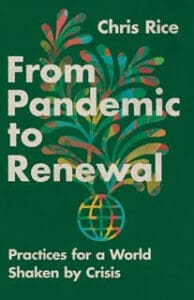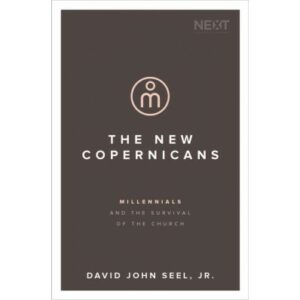Practicing Restorative Justice
 Polarized settings tend to be dominated by an either-or mindset. It’s oppositional thinking. Either you are Right or Left, and ne’er the twain shall meet. They are too divided and opposed to coexist. We might think the same of a thumb and a forefinger. But the thumb is opposable—unlike other fingers, it can be placed on opposite fingers of the same hand. Try to pick up a cup or use a pen without your thumb. But by holding a thumb and forefinger together, well, miracles happen. When we hold two truths together in tension, the business field calls it “opposable thinking.” This way of thinking can open higher levels of truth. We may think that we must choose between forgiveness and justice, that being merciful and being truthful are opposites. But the psalmist presents them as opposable: “Mercy and truth are met together; righteousness and peace have kissed each other” (Psalm 85:10, KJV). When seemingly opposed truths kiss, they open up greater truth.
Polarized settings tend to be dominated by an either-or mindset. It’s oppositional thinking. Either you are Right or Left, and ne’er the twain shall meet. They are too divided and opposed to coexist. We might think the same of a thumb and a forefinger. But the thumb is opposable—unlike other fingers, it can be placed on opposite fingers of the same hand. Try to pick up a cup or use a pen without your thumb. But by holding a thumb and forefinger together, well, miracles happen. When we hold two truths together in tension, the business field calls it “opposable thinking.” This way of thinking can open higher levels of truth. We may think that we must choose between forgiveness and justice, that being merciful and being truthful are opposites. But the psalmist presents them as opposable: “Mercy and truth are met together; righteousness and peace have kissed each other” (Psalm 85:10, KJV). When seemingly opposed truths kiss, they open up greater truth.
The greater, opposable truth expressed in Psalm 85—holding truth with mercy, and justice with reconciliation—is the vision of restorative justice. In contrast to justice whose final end is to punish wrong and compensate the victim, a restorative approach moves to repair the relationship and build a new community. God is anti-oppression. Yet God’s liberation is more than anti-this or that. God’s justice moves toward a goal, a new future, a positive new reality. It moves toward Psalm 85. It moves toward what Dr. King called “the beloved community.”
“We must take sides,” wrote Elie Wiesel. “Neutrality helps the oppressor, never the victim.” That is about not sacrificing truth. “To be a peacemaker is to be a bridge,” said Rev. Rhee. And as he said, “Bridges get walked on from both sides.” That is about not sacrificing love. Taking sides against injustice or being bridges between divided groups—must we choose?
In the peacemaking journey of restorative justice that God invites us into, these callings are not opposed but, like the thumb and forefinger, opposable parts, which only by being held together can be faithful to the task.
Because love without truth lies. And truth without love kills.
Truth Without Love Kills
Love without truth lies. And truth without love kills.
Luke-Acts is a two-volume work, and we can sketch the contours of holistic peacemaking in Luke’s story—from Jesus’ mission statement to “proclaim good news to the poor” and “set the oppressed free” (Luke 4), to his Samaritan who pays a high cost to cross divides to serve the vulnerable (Luke 10), to his final words sending his disciples across borders and barriers to “the ends of the earth” with a new We.
This brings me, with fear and trembling, to perhaps the three most unpopular words Jesus ever said: “Love your enemies.” They are also in Luke’s story (6:27) and need to be added to Jesus’ way of peacemaking, which Luke presents us. Those words disturbed his disciples. They certainly disturb me. But the new order of Jesus does not duplicate the old order of seeking change. It is a whole new reality. Jesus strikes at the roots of sin and violence. Loving enemies doesn’t mean ignoring injustice.
Loving enemies does not minimize sin or evil. Loving those who hurt and offend and with whom we are in a deep disagreement does not mean pretending everything is okay.
The love of Christ opposes oppression and abuse. And the love of Christ always seeks to engage and restore those caught in sin. On the night he was betrayed, Jesus washed the feet of Judas who would betray him and Peter who would deny him. He washes the feet of those who oppose him not after they repent, but “while we were yet sinners” (Romans 5:8, KJV). In Christ, justice and liberation are not separated from love and reconciliation.
Just as we cannot grow without people who tell us the truth and guide us on the road to repair what is wrong, we also need people who get this truth into our bones: even when we sin, we are beloved. Just as we need truthful peacemaking, we need loving peacemaking.
The peacemaking way of Jesus holds together prophetic truth and pastoral love. It is a positive approach, always seeking restoration and healing. But it is also important to remember that we are not Jesus. We are not the Messiah. Unlike Jesus, we cannot, and sometimes must not, get close to every person who harms us. What God does call us to is seeking to forgive.
Some Practices to Hold Together Truth and Love: Here are some actions we can take to put peacemaking into practice in our daily lives.
Raise uncomfortable questions. “Where are your churches on immigration?” Walter Contreras’ question changed some life directions. Ask God for the courage to not fear conflict, and to speak up in your daily settings of work, school, worship. Do it with an eye, not on self-interest, but on the vulnerable, the left out, the places of distrust and alienation. It’s especially important to raise uncomfortable questions in our new era of information bubbles, where we spend too much time with people who think like we do.
Gain skills in peacemaking by getting closer to those who are different from you. Some people are better at telling the truth, others at being bridges. We need both in our lives in order to grow.
Put yourself on unfamiliar ground and seek connection with a group that you fear—and hope for “single stories” to be interrupted. A military general once told me that the greatest problem between North Korea and the United States was not military buildup but a lack of empathy. Our growing divisions in the United States and in the world are plagued with this problem. With others in your school, town, or church, agree to seek an opportunity to go onto unfamiliar ground. As the numbers of nonreligious and atheist students grew at Washington University in St. Louis, some Christians retreated. But students in the InterVarsity chapter on campus took a different approach. One day some of them went to meet atheists in the League of Freethinkers and asked if they would join in a weekend of community service in St. Louis. The atheists agreed. Serving together and informally sharing life experiences inspired mutual respect. A few weeks later, Freethinkers members approached the Christians and asked, “Can we do a Bible study together?” For a congregation, organize a weekend pilgrimage of pain and hope into a community that you fear, seeking to listen and learn.
“But I say to you, love your enemies and pray for those who persecute you” (Matthew 5:44). Jesus said it clearly, directly. That person or group may be distant from you, in the pew or cubicle across the room, on your street, or even in the kitchen. We may not desire it, but Jesus instructed us to begin doing it, little by little. See what happens.
Forming places where, on uncommon ground, we interrupt single stories and together come to see a common truth that this pain here, and that injustice there, is unacceptable—these are the places that are greatly needed in our increasingly polarized world. Working and journeying together to take knees off necks. The ground where this happens is a ground of dying and being raised into new life. It is ground for becoming a new me. And that is where difficult and strange ground becomes holy ground.
Adapted from From Pandemic to Renewal by Chris Rice. ©2023 by Chris P. Rice. Used by permission of InterVarsity Press.
 Chris Rice is the director of the United Nations Office of the Mennonite Central Committee. He is co-author of Reconciling All Things and More Than Equals and author of From Pandemic to Renewal (IVP, ©2023).
Chris Rice is the director of the United Nations Office of the Mennonite Central Committee. He is co-author of Reconciling All Things and More Than Equals and author of From Pandemic to Renewal (IVP, ©2023).


